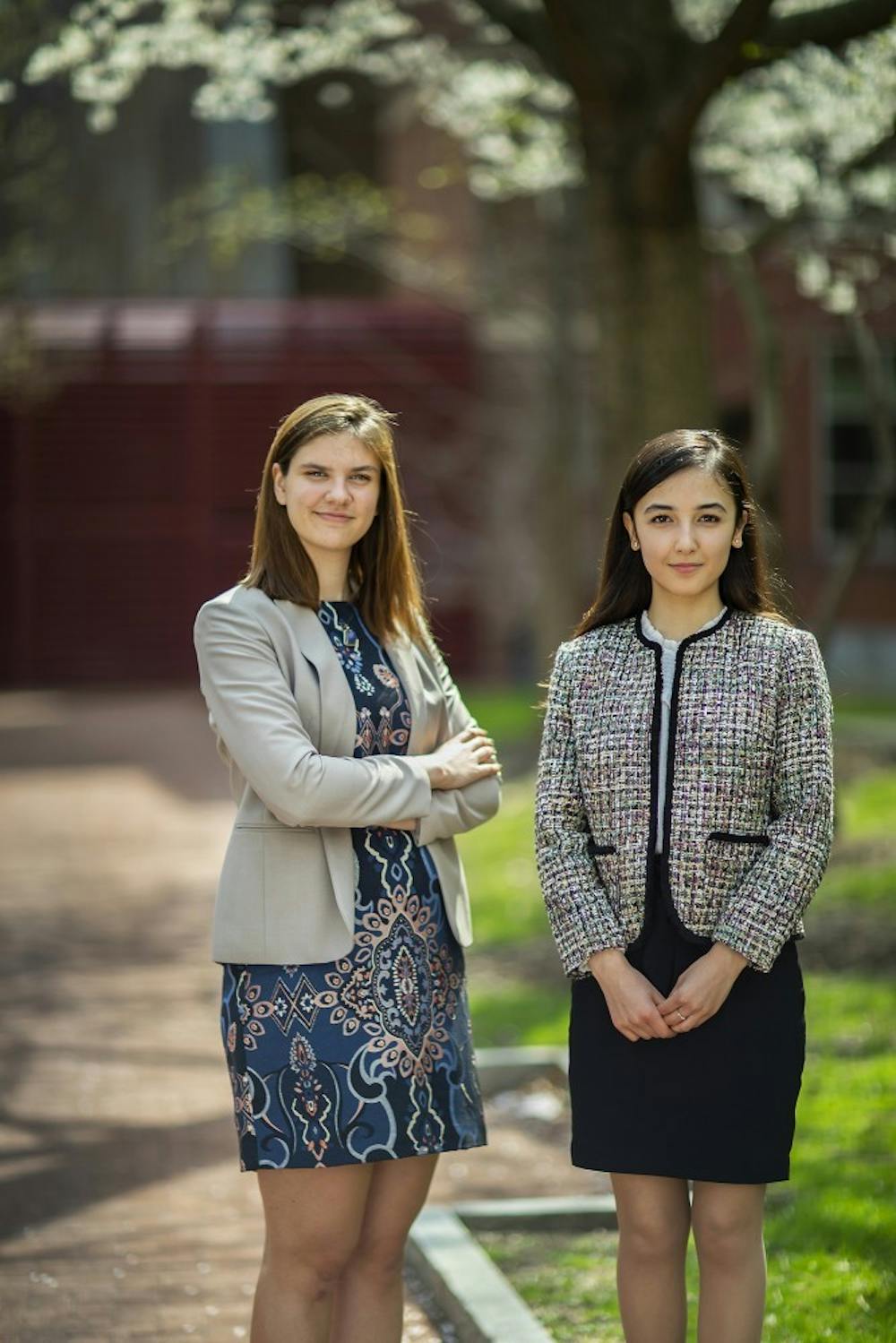When you're in a grocery store, do you notice that the avocados are too hard, or the pears are too soft? Or glance at a rack of browning bananas with resignation, knowing that they'll be too mushy to consume? Or maybe the greenish tinge tells you that they won't be ripe for another few days.
"In a world with our sensors implemented, you'll get the perfect, green avocado and the ripe, juicy apple," Katherine Sizov says enthusiastically. She and her teammate, Malika Shukurova, believe their invention, Strella Biotechnology, offers the potential for full produce consumption by eliminating food loss.
Around 40% of all produce is wasted before it's consumed, a jarring reality that negatively impacts environmental factors such as land usage and freshwater consumption, as well as increasing our carbon footprint.
President Amy Gutmann recently announced that Katherine and Malika's Strella Biotechnology is one of two recipients for the $100,000 President's Innovation Prize (PIP). Although Katherine and Malika were already planning to work on Strella next year, the prize helps them fund more research and development, as well as expand their technology beyond apples in packing rooms.
"One thing I always thought was really interesting about organics is that people buy it because they think it's better for the planet, but actually organic produce spoils way more," Katherine remarks. She adds that organics spoil at a rate of 60%, compared to the typical 40% food loss of non–organic produce.

Katherine, Founder and CEO, and Malika, V.P. of Research and Development, along with three other members of the Strella team–Zuyang Liu, Reggie Lamaute, and Jay Jordan—have built a sensor that detects ethylene, the leading ripeness indicator in fruit.
"You've probably heard the saying, one bad apple spoils the bunch, and it's true," Katherine says. She says that one fruit will release large amounts of ethylene when it begins to spoil, which triggers other surrounding fruits to spoil as well.
Katherine points out that most sensors that aim to prevent spoilage contain man-made compounds, but Strella's technology is novel because it utilizes fruit's own mechanism–discharging ethylene–to sense fruit maturity. That's how they "hacked the fruit."
The first application of their tech is packing rooms, because they are the "biggest, simplest market," Katherine notes. "They're on the upper end of the supply chain and have huge volumes of fruit; one storage room has about 4.5 million apples," she says. In October 2018, they finalized the sensor prototype and started an ongoing trial with a company in Washington—one of the largest apple packers in the country occupying 3% of the entire US market.

The company wanted to keep their fruit until this July, but Strella Biotech was able to detect increasing ethylene levels in February. Informed of the risk, the company was then able to make adjustments to the conditions of their packing rooms. Their preemptive action saved them approximately $3 million of product.
"What we are promising is that if our sensors are used for organics, which are more prone to spoilage, packers will face decreased risk of produce loss," Malika says.
Katherine and Malika hope that Strella's technology will encompass the entire supply chain—from packing to delivery to grocery stores. "Stores think, let's just bring in the hard avocados because we know they're not going to spoil," Katherine says. "They sacrifice taste and consumer experience."
Malika adds that this is where stores can benefit from Strella's technology: "stores can use our sensors to perfectly time and monitor ripeness levels."
Not only does Strella promise to increase revenue for fruit packers, suppliers, and markets, but the technology also has tremendous potential to help the environment as well.
"If you're losing 40% of your produce, that means you're using nearly twice as much land to sell the same amount of fruit, but if you could optimize so that 100% of the fruit you grow is actually consumed, then you need 40% less land," Katherine explains.
Malika chimes in that preventing food loss would save 308 million hectares of land and 7% of the world's freshwater consumption. She also adds that "the carbon dioxide footprint of food waste is larger than that of all US transportation combined," emphasizing the environmental benefits Strella's technology offers.
The idea for Strella Biotechnology started with Katherine, during her sophomore year while procrastinating her work in her lab.
"I've been working in labs for a long time, and it's always been neuromuscular disorders and neuroscience, but I like to procrastinate and read papers that are absolutely irrelevant to what I'm studying or doing in my life," Katherine says, laughing.
That's when she read in a paper irrelevant to her neuroscience studies that 40% of produce is wasted before it is even consumed, saying "So I thought, well, hell, I'm a biologist, and this sounds like a biology problem," Katherine remembers. Surprisingly, the winners met through Penn's Russian Club, and they're both fluent in Russian. It was in the beginning of their junior year that Katherine talked to Malika about doing something to solve the food wastage problem she'd read about.
"I got super interested, because I had no idea about the agricultural sector, and I wanted to be involved in this project because of this mission. Apart from its mission, I love working on it because I can combine biological and technical areas of my experience," Malika says.
"We have a great team, and we all love each other," Katherine says, smiling. Between the electrical engineer, molecular biologist, chemist, and bioengineer, "we could make a sensor that's properly cohesive."
"Strella," pronounced in Russian, means "arrow," they explained. "It's straightforward and fast–moving," truly embodying the story and team behind the technology.







